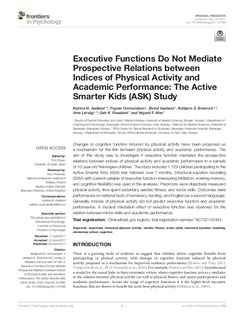Executive functions do not mediate prospective relations between indices of physical activity and academic performance: The Active Smarter Kids (ASK) study
Aadland, Katrine Nyvoll; Ommundsen, Yngvar; Aadland, Eivind; Brønnick, Kolbjørn Selvåg; Lervåg, Arne; Resaland, Geir Kåre; Moe, Vegard Fusche
Journal article, Peer reviewed
Published version
Permanent lenke
http://hdl.handle.net/11250/2591974Utgivelsesdato
2017Metadata
Vis full innførselSamlinger
- Import fra CRIStin [3604]
- Institutt for idrett, kosthald og naturfag [1006]
Originalversjon
Aadland, K. N., Ommundsen, Y., Aadland, E., Brønnick, K. S., Lervåg, A., Resaland, G. K. & Moe, V. F. (2017). Executive Functions Do Not Mediate Prospective Relations between Indices of Physical Activity and Academic Performance: The Active Smarter Kids (ASK) Study. Frontiers in Psychology, 8. 10.3389/fpsyg.2017.01088Sammendrag
Changes in cognitive function induced by physical activity have been proposed as a mechanism for the link between physical activity and academic performance. The aim of this study was to investigate if executive function mediated the prospective relations between indices of physical activity and academic performance in a sample of 10-year-old Norwegian children. The study included 1,129 children participating in the Active Smarter Kids (ASK) trial, followed over 7 months. Structural equation modeling (SEM) with a latent variable of executive function (measuring inhibition, working memory, and cognitive flexibility) was used in the analyses. Predictors were objectively measured physical activity, time spent sedentary, aerobic fitness, and motor skills. Outcomes were performance on national tests of numeracy, reading, and English (as a second language). Generally, indices of physical activity did not predict executive function and academic performance. A modest mediation effect of executive function was observed for the relation between motor skills and academic performance.

